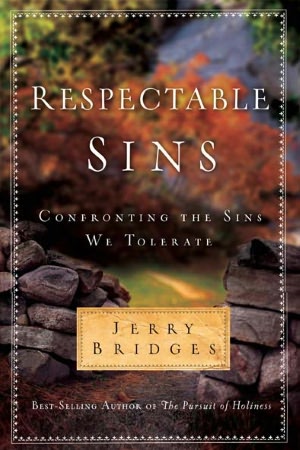Welcome back! For those who are still hanging in there, we are doing chapters 5 and 6 this week of Respectable Sins: Confronting the Sins We Tolerate . These are the last two chapters before getting into the nitty-gritty mess of our ‘respectable’ sins. In these chapters, Bridges reminds us that we are not alone in our battle against sin. We’ve been given the Holy Spirit to help us put our sins to death. He also gives us practical ideas on what steps to take as we battle each of our respectable sins.
. These are the last two chapters before getting into the nitty-gritty mess of our ‘respectable’ sins. In these chapters, Bridges reminds us that we are not alone in our battle against sin. We’ve been given the Holy Spirit to help us put our sins to death. He also gives us practical ideas on what steps to take as we battle each of our respectable sins.
Questions for you to journal in response to these chapters:
Chapter 5
1. Bridges reminds us that the only reason we can even fight against sin is because we have been forgiven. God forgives us not because He is being lenient, but because His justice has been satisfied. How does this truth that God has forgiven our sin free us to face sin?
2. We are cleansed from both our sin’s power and as well as our guilt from sin. On page 39, Bridges explains that we’ve been delivered from the dominance of sin and have been freed from the remaining presence of sin. Were you aware of this two-part cleansing before reading this chapter? What is your response to this truth? Read Romans 6 for a more detailed look.
3. Though sin is dethroned as the reigning power over our lives, it still seeks to exert a controlling influence in our daily walk. (Don’t I know it!) What does it mean to walk by the Spirit? (read Galatians 5:6)
4. How the Spirit works:
- He brings conviction of sin through our reading of Scripture and through our conscience. Have you ever had this happen where you are reading God’s word and feel a sense of conviction about what you have just read?
- He enables and empowers us to deal with sin-How can we be sure that the Holy Spirit will help us deal with sin and direct our spiritual transformation? (read Romans 8:31, Philippians 1:6, 2:12-13)
- He brings circumstances into our lives that give us opportunity to battle with sin-If I am facing my sin of irritability and frustration, He may give me opportunity to battle that, maybe even through my children’s behavior. How have you seen that in your own life?
- He works in us monergistically-that is, on His own (see the end of p. 43)
5. Sometimes, It seems as though the Spirit is not at work. Have you ever felt that way, like you are in this battle on your own? Be confident that even if you don’t feel Him at work, He always is (2 Cor. 3:18)
6. How important is understanding God’s sovereignty to this battle against sin? (see p. 44)
Chapter 6
Directions for dealing with sins: Bridges gives us a list in this chapter to use as we go through the rest of the book. It may help to write down this list on a 3×5 card and keep it in the book to look at as a reminder.
1. Always address sin in the context of the gospel (read Romans 7:21-25)
2. Learn to rely on the enabling power of the Holy Spirit (read Romans 8:13)
3. We need to recognize our responsibility to pursue all the practical steps for dealing with our sins. “Work as if it all depends on you and yet trust as if you did not work at all.” (read Philippians 4:8-9, Colossians 3:5)
4. Identify specific areas of acceptable sins.
5. Apply specific applicable Scriptures to each sin (Psalm 119:11, 14-15)
6. Cultivate the practice of prayer over the sins we tolerate (Philippians 4:4-7) Pray during planned, consistent times as well as pray short spontaneous prayers asking for the Spirit’s help.
7. Involve one or more other believers in the struggle against sin (read 1 Thessalonians 5:11, Hebrews 10:24)
And for discussion with community: What spoke to you most out of these chapters? Has the Spirit already began the work in helping you identify areas of sin? Do you have anyone in your life with whom you can walk this journey together?





























